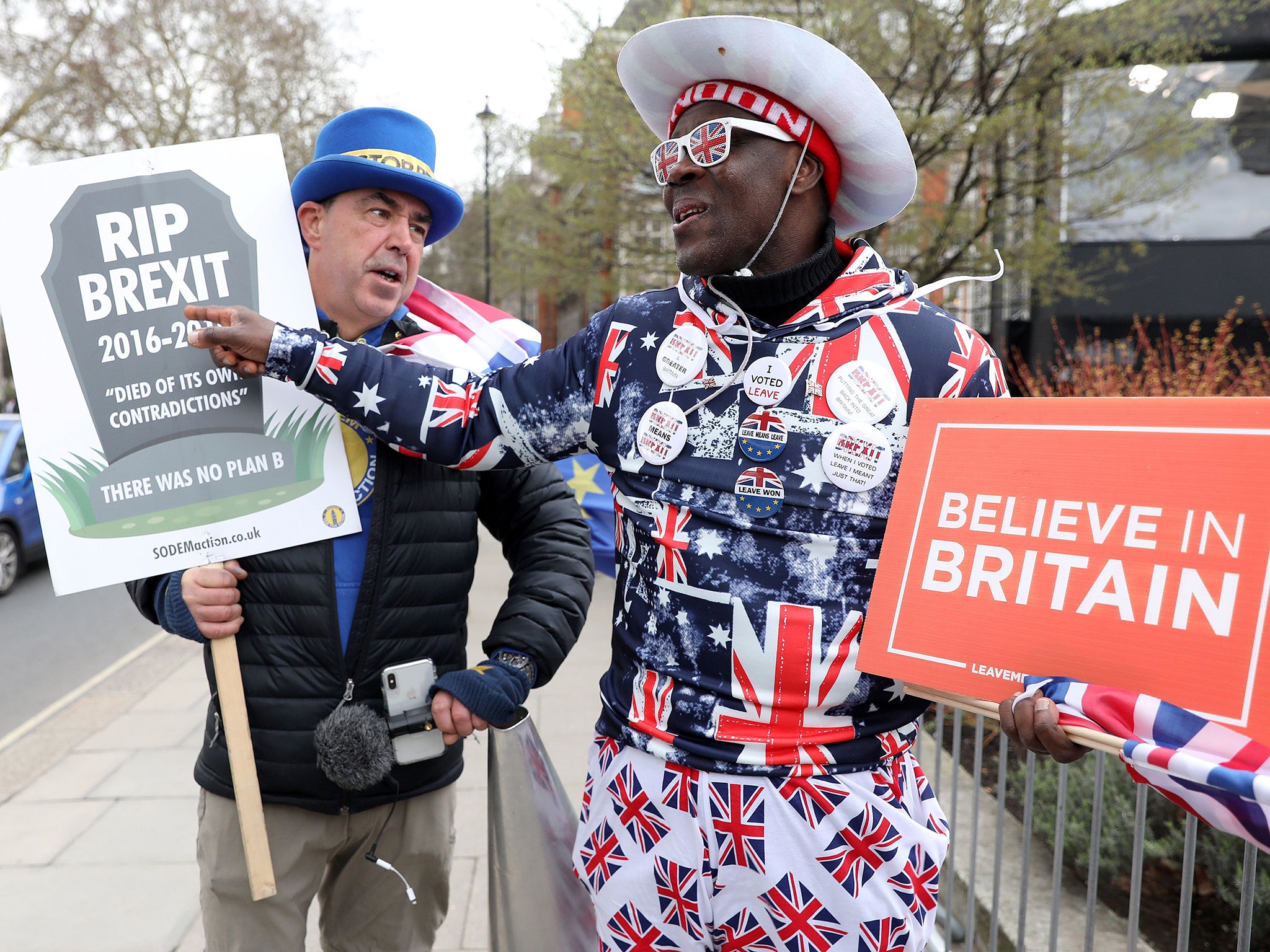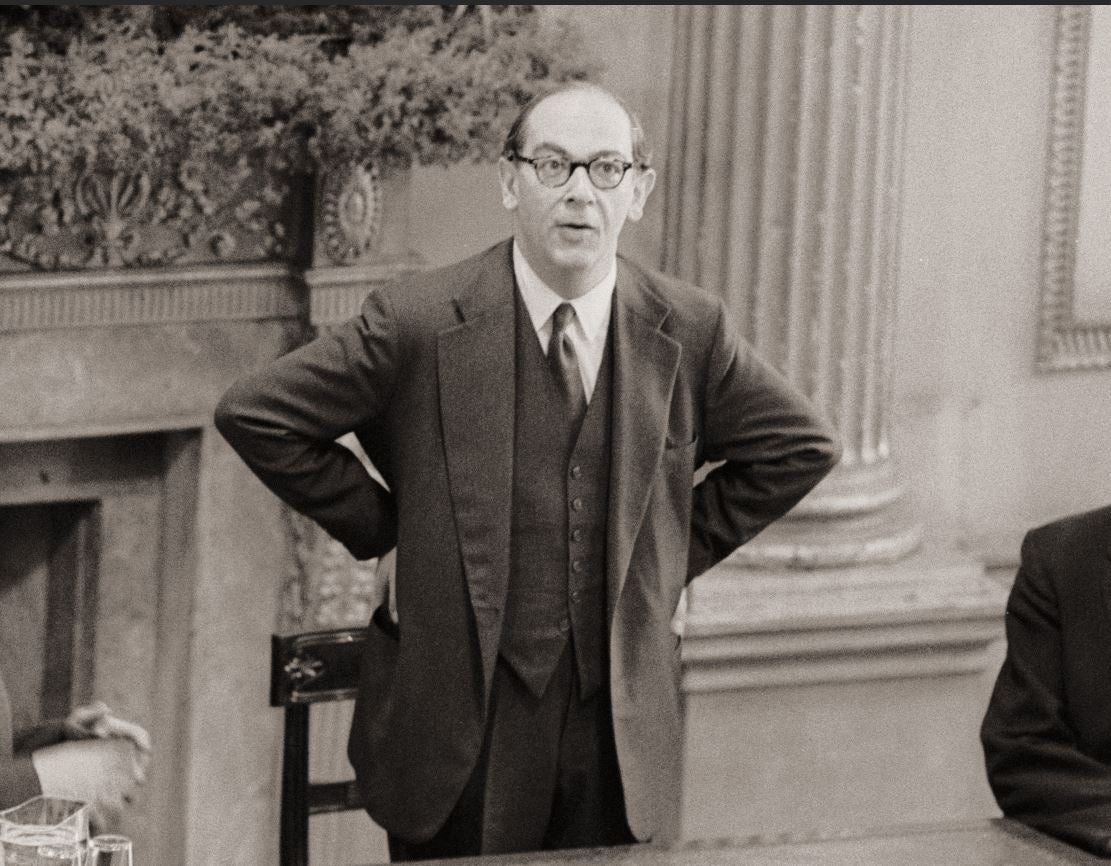‘Freedom from’ versus ‘Freedom to’: What Brexit teaches us about liberty
Brexit is illuminating the idea that the UK wants to be free, but no one agrees on the meaning of the word, says Andy Martin


Probably the saddest thing – among so many sad things – about the current Brexit debate, exemplified by the two television compare-and-contrast PM contenders shows, is that it’s now all about mechanics: when, how, with or without an agreement. The question of why has been all but eclipsed. But if – or when – the second referendum becomes a reality the argument about ends rather than means is going to have to make a comeback.
Camus said that all fiction contains a metaphysical aspect, and something similar applies to politics. When we vote for divorce or continued membership, it is clear that what we are voting for or against is not a real EU or a real UK, but only an idea. It must be in this sense that Boris Johnson intended the phrase, “F*** business!” I would say that it’s not the economy, stupid (as Bill Clinton may have once said), it’s the philosophy. And the fundamental argument boils down, finally, to a single word: freedom.
If we had a constitution, that irresistible word – as in both American and French formulations – would almost certainly appear in neon lights. We are bewitched by freedom. Both pro- and anti-Brexit sides can lay claim to protecting or enhancing it. Brexiteers speak of being “free to crack new trade deals around the world”, as if everyone was about to be issued with a business-class ticket to every country under the sun; while Remainers speak more fondly of “freedom of movement”, suggestive of backpacking and youthful Eurorail passes.
But there are two very different interpretations of freedom built into these positions. It could be that the reason parliament has become paralysed by Brexit is because we are trying to have it both ways, to have our freedom cake and eat it. Many of our unspoken assumptions and attitudes are unpacked in Isaiah Berlin’s classic essay “Two Concepts of Liberty”.
Berlin was a wide-ranging intellectual historian, based at Oxford, with a particular expertise in Russia, since as a child he witnessed the Russian Revolution firsthand. Surveying the ways in which we have used the same vocabulary in radically different ways, he drew a distinction between negative and positive liberty, or “freedom from” and “freedom to”. Berlin argued that “politics has remained indissolubly intertwined with philosophical inquiry”. And it is likely that these antithetical ways of thinking about freedom underpin and inform political divisions on both sides of the Atlantic (and elsewhere). Enthusiasts for one or the other tend to vote Republican or Democrat, Conservative or Labour. In Berlin’s analysis, negative liberty or “freedom from” was associated with some version of liberalism, while positive liberty or “freedom to” was implied by socialism or, in its purist form, communism.

It’s worth bearing in mind that Berlin was writing – or rather, speaking, since his essay first took the form of a lecture at Oxford – at the end of the Fifties, in the midst of the Cold War and the propaganda battle between east and west. Berlin thought of Britain and America as being more in tune with negative liberty, while Russia and other socialist countries were advocates of positive liberty. But he suspected that positive liberty wasn’t really liberty at all but more like, as George Orwell would put it in Nineteen Eighty-Four, “a boot stamping on a human face – forever”.
It’s easy to see the attraction of “freedom from”. Everyone wants to be free from pointless interference, going about their lawful business. To put it the opposite way around, the punishment we have come up with for anyone who offends against the law is to deprive them of their liberty, to lock them up, and make sure that they get maximum interference in their lives. Except in rare and possibly pathological cases, we all instinctively cherish life, liberty and the pursuit of happiness. Very hard to achieve in prison. Hence the pain and misery of confinement.
Rousseau said we are born free and yet find ourselves everywhere in chains. I think it would be truer (if not quite so rhetorically rousing) to say that we are born in such a way as to prepare us for a degree of freedom some way down the road. The umbilical cord has to be cut, but just because you are born doesn’t mean that you are now an independent being. You don’t get very far on your own as a baby.
From quasi-medieval captivity to freedom. Don’t we all want to escape from Stalag Luft III or the Gulag?
According to Lacan’s mirror-stage theory, you don’t even begin to see yourself as a separate being until, around the age of one or two (and thereafter), you look in a mirror and realise that your parents are not there: it’s just you standing there, on your own two feet, and you realise (with mixed feelings of elation and anxiety) that you are ultimately going to have to fend for yourself.
According to the anthropologists, our “systems of kinship” are going to impact on the way we think. The so-called “nuclear family” that is characteristic of the west privileges “freedom from”. It’s right there in the story of the three pigs who have to go and build homes of their own at a certain point (and therefore have to cope with wolves and suchlike). The nuclear family is all about separation and individualism and preparing the next generation to do their own thing. The idea of children living at home with their parents into their third decade and beyond always seems an anomaly or eccentricity to those of us born into that grand tradition (fun thought it may be to see everyone at Christmas).
The “patrilineal” approach (not that far from patriarchal), in contrast, assumes that there will always be a lot of interference in your life, one way or another. You are part not just of a family but of a tribe, a network of relatives and associates. According to recent statistics, 35 per cent of marriages in Iraq are between cousins; in Pakistan it’s something like 50 per cent. The tragedy of Romeo and Juliet is premised on the overriding and oppressive power of those two warring families, the Capulets and the Montagues, who want their progeny to marry someone on their side rather than join the opposition. Shakespeare is reflecting not just a shift in the conception of marriage in Renaissance England, but also a broader genetic imperative to widen the gene pool, or exogamy. By and large there is still a bias against marrying anyone from among your close relatives (or “endogamy”).
Something similar applies to our relationship with Europe. Back in the Sixties, when joining the common market was first floated, it was cast in terms of forming a relationship or coupling with sexy foreigners (notably Brigitte Bardot). Now that the romance is over we are talking about divorce, but with an eye on potential alternate relationships beyond Europe. We want to get more exogamous. Leavers are re-enacting the narrative of the three little pigs. It is in this context that all those Faragist metaphors to do with “throwing off the shackles” (or “yoke” or “fetters”), and the “vassal state” beloved of – or abhorred by – Jacob Rees-Mogg, make sense. From quasi-medieval captivity to freedom. Don’t we all want to escape from Stalag Luft III or the Gulag? The Shawshank Redemption will probably never go out of fashion. Escape to Victory may not be quite at the same level, but the spirit is there.

Leavers have a whole raft of metaphors and deep-laid preferences to sail away on. Or imaginary Spitfires to fly in. And they, to some extent, have the backing of Isaiah Berlin himself. Berlin, although himself very much a European, bestriding cultures and languages, certainly favoured the “freedom from” argument. He harks back to the foundations of liberalism in the 19th century in the aversion to dictatorship and especially Napoleon issuing dictates from afar. Very much like Brussels.
When John Stuart Mill, in his essay “On Liberty”, suggested drawing a circle around the individual that should be inviolate, he was at some level replicating the map of the island nation surrounded by water, immune to invasion or perversion. There is something of this in Berlin too, grateful to the country that he adopted and that adopted him. He saw negative liberty as the prerequisite of pluralism. But what he tends to underplay is that in one of its most radical formulations, negative liberty also suggests freeing ourselves from assorted scapegoat figures who are holding us back, stamping on our nice, white faces with their Jewish or immigrant boots. Haven’t we reached “breaking point”? Negative liberty, especially when accompanied by military values, trembles on the brink of fascism. Berlin noted that “liberty in this sense is not incompatible with certain forms of autocracy”.
Shouldn’t we rather want positive liberty then – freedom to? Here, surely, lies the crux of the Remain argument in the event of a final say. Membership of the EU doesn’t need to be seen in terms of “union” or a marriage that not everyone necessarily wants to sign up to, but rather in our increased ability to do things we would not otherwise be able to do. We have (now) and would have (if we remain) freedom to travel in 27 countries without let or hindrance. Freedom to take up employment in France or Germany or Latvia (where Berlin was born). We would have greater freedom to act on climate change in association with our neighbouring countries (even if we also need a global agreement). Freedom to collaborate in science and on security. Open borders, notably in Ireland.
Everything must be sacrificed on the altar of Brexit
What could possibly be wrong with positive liberty? According to Isaiah Berlin, rather a lot. He sees the roots of positive liberty in Rousseau’s Social Contract in which the first rule is subordination to the “general will”, enabling the idea that you can legitimately be “forced to be free”. This concept of freedom is in fact compatible with rather a lot of coercion and constraint, since it plays down “freedom from”.
Maybe the most extreme form of this version is contained in Jean-Paul Sartre’s existentialist notion of “absolute freedom”. You’re always free, says Sartre, even when you’ve been arrested by the Gestapo and are strapped to a chair and being tortured because you can still choose the moment at which you cave in. You’re still free, nominally, as a black man being lynched and castrated (he is quoting a novel by William Faulkner but the point is not necessarily fictional) because of the way you look at your white captors and tormentors. Not many people are going to feel wholly at ease with that version of freedom. No wonder that Berlin saw positive liberty as tantamount to totalitarianism.

Berlin reckoned that there was a fundamental clash between these two concepts of liberty. Your politics enshrines either one or the other. You have to choose. It was one of Berlin’s most recurrent arguments that you can’t have it all, that there are certain values that are simply incompatible with other values, or “incommensurable”. In the end you may have to take up arms to defend one idea or another. At the very least we can get passionate and intense about it. According to a poll published this week, more than 50 per cent of the Conservative Party’s membership don’t care if Brexit destroys their own party. Three in five don’t care if it dismembers the UK and wipes out the British economy. Everything must be sacrificed on the altar of Brexit. Another of those rather absolutist, extreme forms of liberty in which you are, in effect, lynching and castrating yourself. Again, not an interpretation that most people are going to feel all that comfortable with.
60
Percentage of the Conservative Party’s membership that don’t care if Brexit dismembers the UK and wipes out the British economy
The plain reality is that, despite Berlin, we really do want both “freedom from” and “freedom to”. We want them to be compatible, and some hybrid, compromise mix of the two may well be the only form of freedom that we recognise as such since the two purist, fanatical versions of positive and negative liberty both end up looking like the opposite of freedom, where some large number of misfits need to be locked up or excluded and possibly annihilated too.
Discord and even chaos, as Berlin argued, is normal and has to be embraced as one of the conditions of freedom. The worst idea we have came up with, he points out, is that there might be “a final solution”. But it is possible that greater explicitness about exactly what freedom means will resolve the argument in one direction or another. Or at least clarify it. In this realm there is no truth and only conflicting metaphors. But we owe it to ourselves to try and elucidate what we mean by them. Leavers and those advocating “freedom from” need to acknowledge that in choosing one form of freedom (getting “out”) they are also relinquishing other kinds of freedom. And Remainers need to re-affirm their vision of the kinds of protection (freedom from) and the opportunities (freedom to) that are offered by staying in.
What would Isaiah Berlin have said about the Brexit Party? The key to his most famous essay, “The Hedgehog and the Fox”, is the idea that “the fox knows many things, but the hedgehog knows only one big thing”. The Brexit Party is a party for hedgehogs.
Andy Martin is the author of ‘Reacher Said Nothing: Lee Child and the Making of Make Me’. He teaches at the University of Cambridge
Join our commenting forum
Join thought-provoking conversations, follow other Independent readers and see their replies
Comments